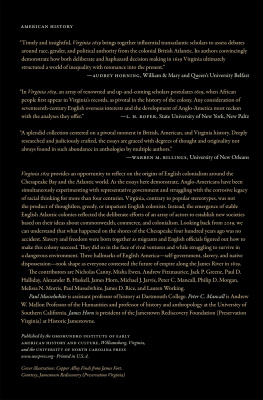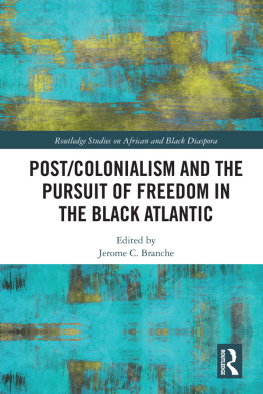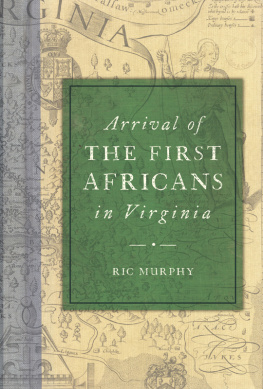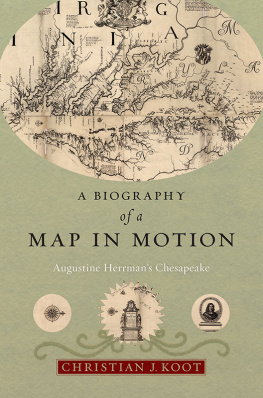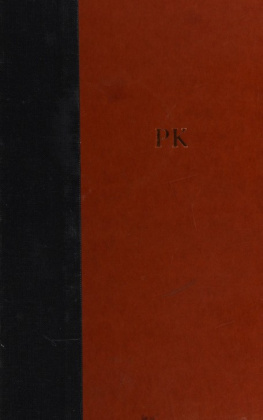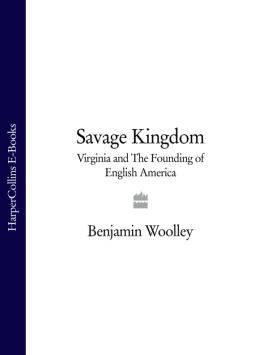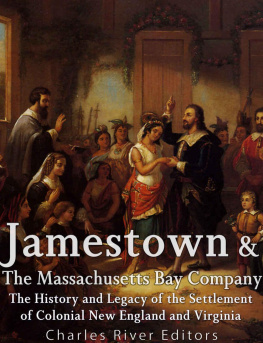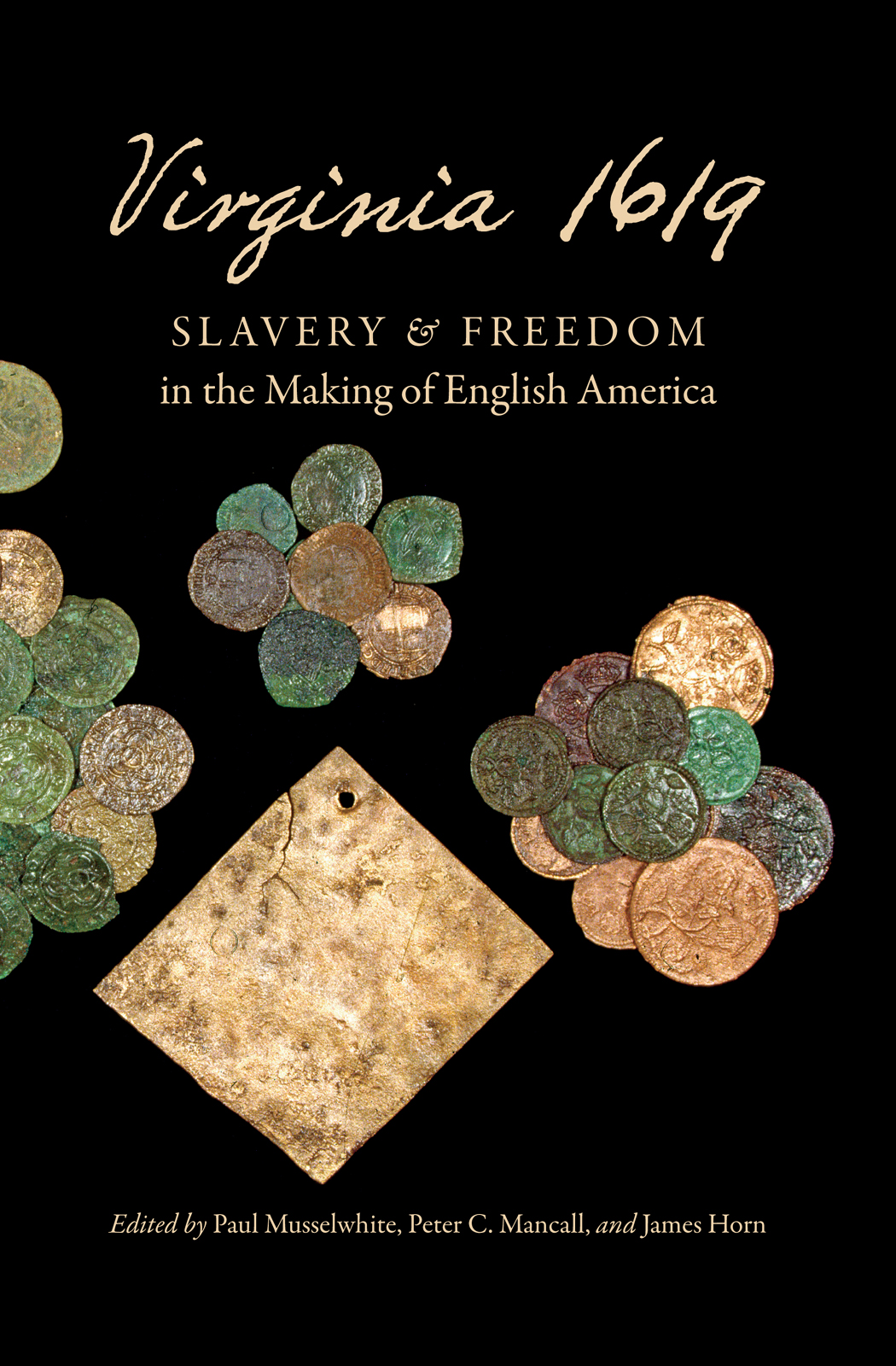Virginia 1619
Slavery and Freedom in the Making of English America
Edited by
PAUL MUSSELWHITE, PETER C. MANCALL,
and JAMES HORN

Published by the
OMOHUNDRO INSTITUTE OF
EARLY AMERICAN HISTORY AND CULTURE,
Williamsburg, Virginia,
and the
UNIVERSITY OF NORTH CAROLINA PRESS,
Chapel Hill
The editors and publishers gratefully acknowledge the generous support for this book from Dartmouth College and from the 2019 Commemoration, American Evolution.
The Omohundro Institute of Early American History and Culture is sponsored by the College of William and Mary. On November 15, 1996, the Institute adopted the present name in honor of a bequest from Malvern H. Omohundro, Jr.
2019 The Omohundro Institute of Early American History and Culture
All rights reserved
Manufactured in the United States of America
Cover illustration: Copper Alloy Finds from James Fort. Courtesy, Jamestown Rediscovery (Preservation Virginia)
Library of Congress Cataloging-in-Publication Data
Names: Musselwhite, Paul, editor. | Mancall, Peter C., editor. | Horn, James P. P., editor.
Title: Virginia 1619 : slavery and freedom in the making of English America / edited by Paul Musselwhite, Peter C. Mancall, and James Horn.
Description: Williamsburg, Virginia : Published by the Omohundro Institute of Early American History and Culture ; Chapel Hill : The University of North Carolina Press, [2019] | Includes bibliographical references and index. | Although this volume centers on the events of a sweltering summer in the Chesapeake Tidewater, it began life in the mountains of northern New England. It grew out of a conference hosted at Dartmouth College in the spring of 2017 Acknowledgments page.
Identifiers: LCCN 2018058603| ISBN 9781469652016 (cloth : alk. paper) | ISBN 9781469651798 (pbk : alk. paper) | ISBN 9781469651804 (ebook)
Subjects: LCSH: VirginiaHistoryColonial period, ca. 16001775. | VirginiaPolitics and governmentTo 1775. | African AmericansVirginiaHistory17th century. | Indians of North AmericaVirginiaHistory17th century. | SlaveryVirginiaHistory17th century. | DemocracyUnited StatesHistory.
Classification: LCC F229 .V835 2019 | DDC 975.5/01dc23 LC record available at https://lccn.loc.gov/2018058603
The University of North Carolina Press has been a member of the Green Press Initiative since 2003.
Acknowledgments
Although this volume centers on the events of a sweltering summer in the Chesapeake tidewater, it began life in the mountains of northern New England. It grew out of a conference hosted at Dartmouth College in the spring of 2017. The conference was generously funded by the Dartmouth Conference Fund, which was established by the gift of Fannie and Alan Leslie. We are extremely grateful to all those at Dartmouth who helped to organize the conference, particularly Gail Patten and Courtney Hardy. The papers presented at the conference were honed and sharpened by the rich and collegial dialogue over two days in Hanover. We would particularly like to thank Warren Billings, Amy Turner Bushnell, Colin Calloway, John Coombs, Linda Heywood, Emily Rose, and James Walvin for their many critical contributions to the discussion.
Bringing this volume to press in such a speedy fashion has relied upon the generosity and efficiency of all the contributors, but also particularly the organization and flexibility of the staff at the Omohundro Institute of Early American History and Culture. Paul Mapp and Nadine Zimmerli offered extremely helpful feedback on the manuscript, and Nadine and Cathy Kelly have shepherded it through the production process, keeping us on schedule through each step. Becky Wrenn and Ginny Chew have edited the essays with an amazing combination of haste and thoroughness. Jonathan Chipman has dedicated many hours to drawing the wonderful maps of far-flung locales according to the different requirements of our authors. Cynthia Ingham has also provided invaluable assistance in organizing and indexing. The publication of this volume has also been supported by Jamestown Rediscovery and the 2019 Commemoration, American Evolution.
Contents
JAMES HORN and PAUL MUSSELWHITE
PETER C. MANCALL
LAUREN WORKING
NICHOLAS CANNY
PHILIP D. MORGAN
MICHAEL J. JARVIS
MISHA EWEN
PAUL MUSSELWHITE
ALEXANDER B. HASKELL
ANDREW FITZMAURICE
JAMES D. RICE
PAUL D. HALLIDAY
MELISSA N. MORRIS
JACK P. GREENE
Virginia 1619
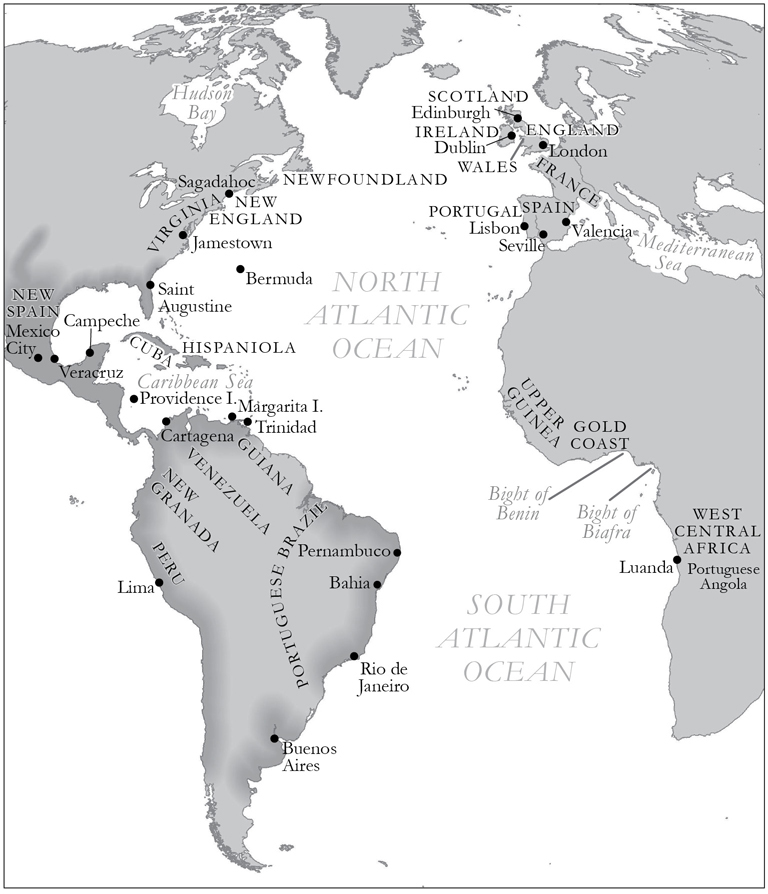
The Atlantic World in 1619. Drawn by Jonathan W. Chipman
Introduction

JAMES HORN and PAUL MUSSELWHITE
In the summer of 1616, John Rolfe sat down to write a brief description of Virginia. He had recently arrived in London accompanied by his wife, Rebecca, better known as the Indian princess Pocahontas (daughter of the great Powhatan chief Wahunsonacock), their baby son, Thomas, Pocahontass sister Matachanna, and her husband, Uttamatomakkin, an adviser to Opechancanough, the Powhatan war chief and Wahunsonacocks de facto successor. Traveling with them were another half dozen or so Powhatans, young and old, including several women of marriageable age who the English hoped might be persuaded to convert to Christianity and wed suitable Englishmen; a Spanish spy, Don Diego de Molina, who had spent five years in captivity at Jamestown; and the tough military commander and deputy governor of Virginia, Sir Thomas Dale. All had sailed from Jamestown on the warship Treasurer, captained by the experienced mariner Samuel Argall. The Treasurer would return to Jamestown the following year, bringing Argall back to begin a tempestuous tenure as deputy governor. It would come again to the shores of the Chesapeake in 1619, this time in consort with the White Lion, carrying a cargo of captive Africans. Those voyages lay in the future. But the future was a topic on the minds of all the Treasurers passengers in 1616.
Besides being one of the strangest collections of travelers to cross the Atlantic in this period, the backgrounds of the voyagers, their reasons for going to England, and their political and commercial networks offer revealing insights into the complexity and variety of interactions that characterized the emergence and latency of English America. Dale, for example, had arrived in Virginia in 1611 in the midst of a devastating war against the Powhatans. Serving as high marshal responsible for prosecuting hostilities, he had been recommended for the position by Sir Robert Cecil, first earl of Salisbury, and Sir Henry Wriothesley, third earl of Southampton, politically powerful and immensely wealthy men who were leading figures in the Virginia Company of London, the financial sponsor and governing authority of the colony. Dale had expanded strict martial laws, enacted to control unruly settlers and enforce law and order; these laws would later prompt intense criticism of company leaders treatment of settlers in these years. At an especially low ebb in the fortunes of the colony, he had succeeded in avoiding what would have been a disastrous defeat at the hands of the Powhatans, which might well have led to the end of the enterprise, and had eventually secured peace with the great chief, symbolized by the marriage of John Rolfe and Pocahontas in April 1614. Believing the English and Indians were now firmely united together, and made one people, Dale and the company looked forward with confidence to the steady and infinit profits they had promised investors but that had so far proved elusive. I have seen the best countries in Europe, he told Sir Thomas Smythe, treasurer of the Virginia Company, in his usual blunt manner, but I protest unto you, before the Living God, put them all together, this country will be equivalent unto them if it be inhabitant with good people. He had introduced incentives for settlers to produce a range of crops and commodities that would increase productivity and encourage a diverse economyindustrial goods such as pitch, tar, and potash as well as crops such as sassafras, silk grass, hemp, and tobacco. Anyone could grow it, planter and secretary of the colony Ralph Hamor wrote of tobacco, and he assured his readers that it would provide sufficient profit for the planters needs with little labor. On arriving back in Plymouth, England, in early June 1616, Dale reported with satisfaction that he had left the colony in great prosperytye and pease [peace] contrarye to manye mens Exspectatyon. If his boast was somewhat inflated, there can be little doubt his influence on the fledgling colony had been huge and would have a highly significant bearing on what was shortly to come.

